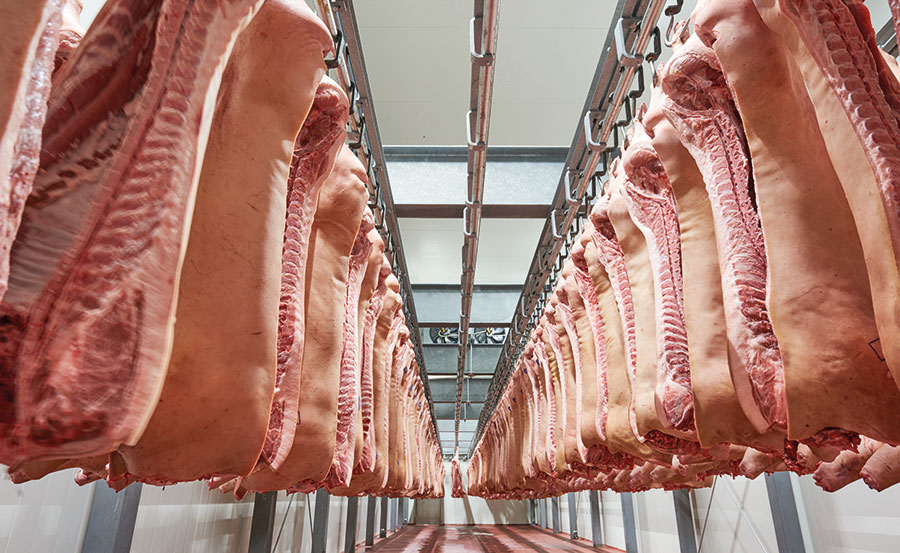The Association of Independent Meat Suppliers (AIMS) has expressed growing concerns over the Food Standards Agency’s (FSA) plans to raise charge rates for the meat industry.
The FSA has issued a Call to Evidence in relation to its charging structure for Official Controls (OC) in abattoirs, where Official Veterinarians and Meat Hygiene Inspectors inspect every animal and carcase to ensure regulations are complied with and that the meat is fit for human consumption. Charges are currently discounted according to the number of hours involved so that smaller abattoir businesses, which require fewer hours regulation, receive a greater discount.
“Inflationary pressures are affecting all sectors, yet the FSA’s decision to pass these costs directly onto the industry is both excessive and dangerous,” said AIMS’ head of external affairs Dr Jason Aldiss.
He said the FSA’s ‘highly expensive and ineffective’ Official Control delivery model was already causing significant harm, with the meat industry essentially footing the bill for the profits of private veterinary companies contracted by the agency.
“The FSA’s gold-plated veterinary attendance requirements in slaughterhouses combined with the profit-making objectives of their delivery partners, have resulted in plants being both overstaffed and overcharged to the detriment ultimately of the consumer,” he added.
“Furthermore, the FSA is deeply bureaucratic and inefficient, with multiple layers of management idling and administrative processes adding unnecessary costs.”
“The FSA charges are exorbitant compared to other EU regulators those putting the UK meat industry at a severe competitive disadvantage in both domestic and oversea markets”.
AIMS is calling for a fundamental overhaul of the FSA’s charging mechanism, advocating for a headage-based system, which is globally recognised and used by most regulators, and, it said, would eliminate the need for any form of discounting overnight and streamline costs for industry operators.
Mr Aldiss urged the agency to moves towards a fairer, more efficient system that serves both the taxpayer and the industry.
“We must be clear: if the FSA removes the current discount structure without addressing the gross inefficiencies in its bloated bureaucracy, over half of Britain’s meat plants could face immediate closure. Such an outcome would directly undermine the UK’s food security, vibrant local communities, and economic growth – objectives that the Labour government has rightly prioritised to help navigate the ongoing financial crisis,” he said.
“It is now up to the FSA to take stock and ensure it does not single-handedly destroy the foundations of the UK meat industry.”
He called for industry stakeholders to make their voices heard during the FSA’s Call for Evidence on meat charging, ahead of the Board’s discussion on December 11.
Small abattoir concerns
Rare Breeds Survival Trust (RBST) reacted to the FSA’s Call for Evidence by warning that increasing FSA charges for small abattoirs would create a major new challenge in the ongoing collaborative effort to reverse the decline of the network.
RBST chief Eexecutive Christopher Price said: “It is crucial that smaller abattoirs continue to receive this discount on the cost of FSA regulation.
“A robust and resilient local abattoir network, capable of processing small numbers of different species and breeds, is vital for the sustainable livestock sector, particularly those farmers and smallholders keeping native breeds.
“Reducing or removing the discount would put even greater pressure on already struggling businesses, posing a serious challenge to ongoing efforts to reverse the decline in the small abattoir network and having a serious impact on farmers and food producers more generally who would inevitably see a consequential increase in their costs.
“There are of course also the animal welfare implications of longer journey times if farmers have to take their animals to more distant abattoirs.
“Over the past year the collaborative effort to reverse the decline of small abattoirs has been strongly supported through government policies such as the Small Abattoir Fund, and we urge the new Defra Ministerial team to ensure that the important progress being made is not decimated by an increase in FSA charges.”




